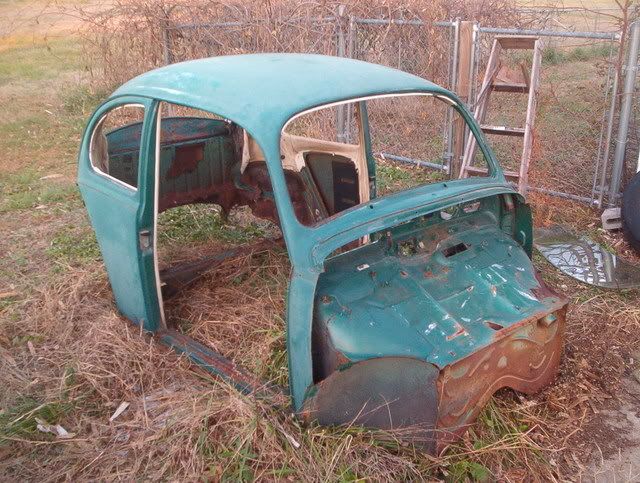

This has been a long project , actually taken years to complete. We raced at Drag Nite . Here is a video of the pass he made,
http://s91.photobucket.com/user/dragvw2180/media/20160709_180101%201_zpspekw2...
We did everything ourselves , chassis, , engine , trans , body and paint
Car ran 6.41 , 1.35 60 ft and weighs 2050 , a street car.
If anyone is interested I will post the build pics. Mike McCarthy
Of course- give us something. Well done.
Build pics would be great! thanks Mike!
This is what we started with , she had been hit in front so we cut off the bad stuff, hey it was free.

Originally we were going to do a simple 3" trans raise, here is the mock up on that, After looking at the pan and rollcage we decided to go further
by back halfing the car and went to ladder bar suspension.
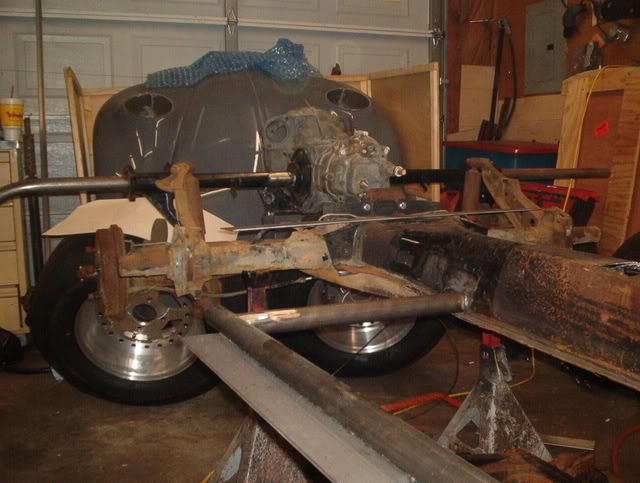
John my racing partner decided he liked the way my old car handled so we copied my front suspension and narrowed his beam 7" same as I had. We used
Ghia front brakes so it kicked out the wheels slightly and made the narrowed beam fit perfectly.

We like alot of caster so we fabbed up some shims, 15 degrees caster makes the car want to go straight. After aligning the front end we welded the
shims to the body so nothing could move.
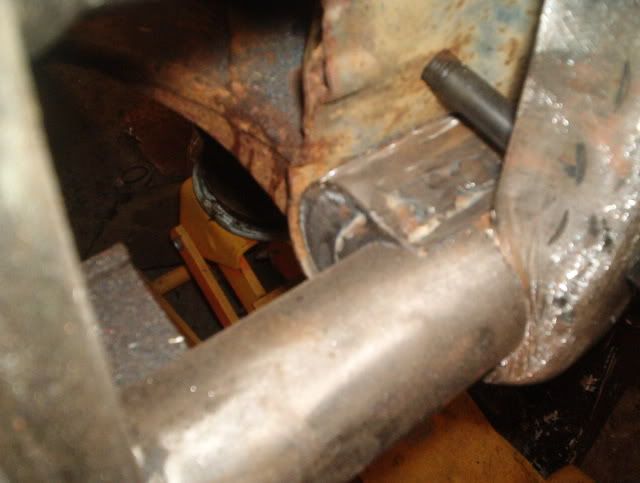
Well we got to the point where we had to start on the roll cage, after drinking a few shots of tequila and a few beers we reassessed the direction of
the car . We decided to not only raise the transmission 4" but to also back half it and do ladder bars.
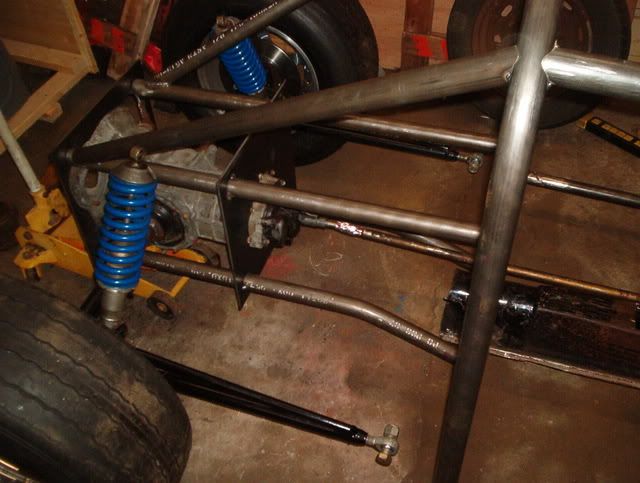
We welded the front transmission mount plate in and it made the rear really ridged , the engine mount we used 4 stock bolts so we could remove it for
ease of trans replacement. We made bungs that were welded inside the tubing for those bolts.
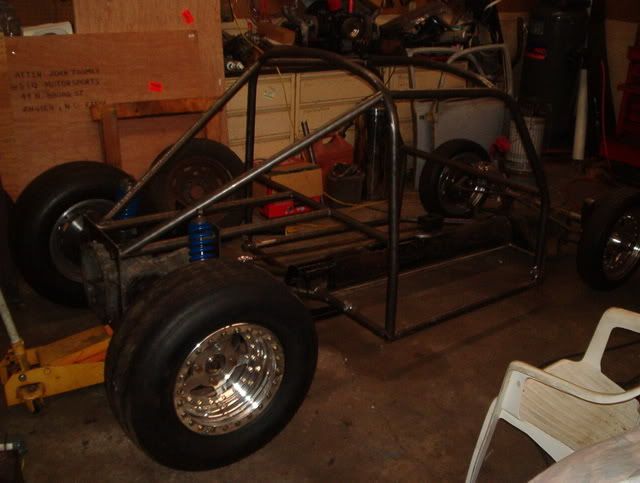
we both replaced and moved some pipes as we went along , tack as you go and weld once.
Our original ladder bars ended up being 4" too short to work correctly so we made new ones and also the plates to bolt them to. After reading some
chassis books we discovered we accidentally put everything exactly where it should be . We made in way more adjustments on everything which will allow
us to change any setting.
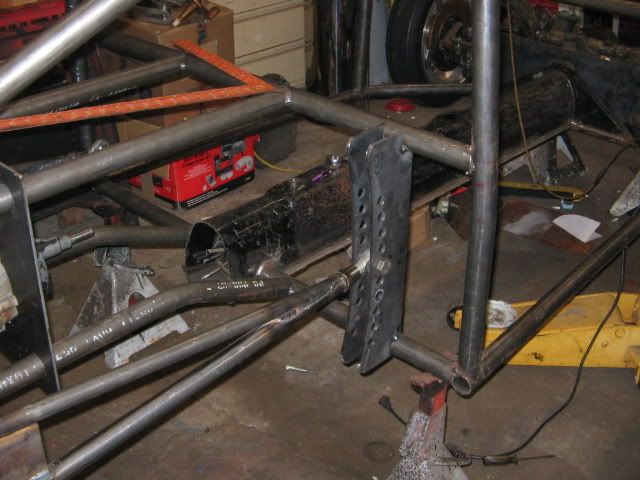
These were my two supervisors, they overlooked every weld I did and kept me company, miss my old lab.
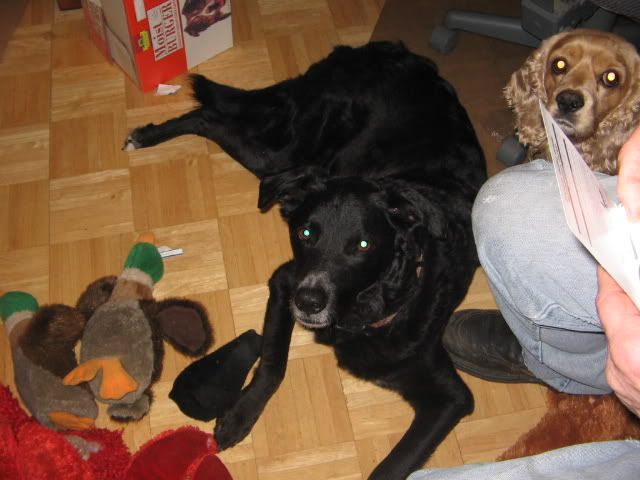
Here you can see we installed new floor pans and started on the interior metal work. We decided that since this was going to be a street/race car that
we wanted to upholster everything, carpeting and padding covers the sheet metal interior later down the road.
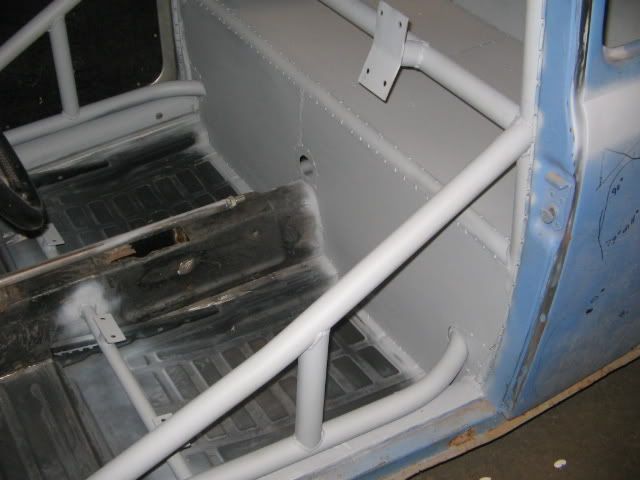
you can see the way we mounted the race seats and we had the chassis certed for 8.5 1/4 before doing the tin work
A pic of the transmission we built , a duplicate of mine. Autocraft case and all the accessories
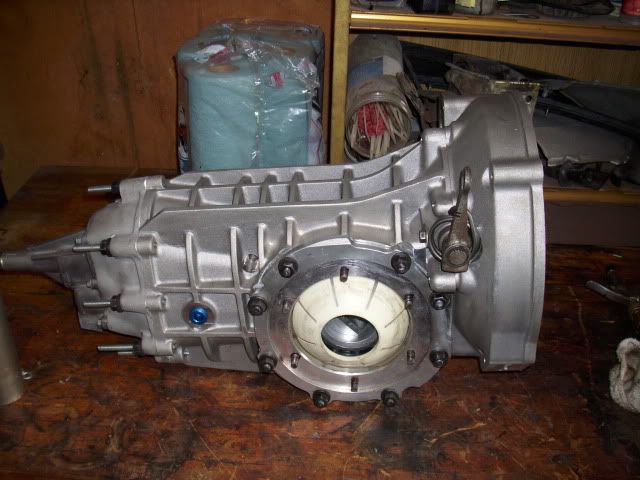
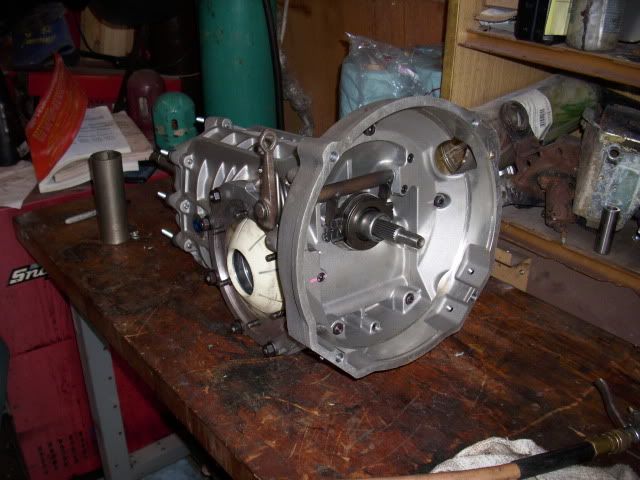
The last of the chassis work done until we refit the body ,it actually rolls.
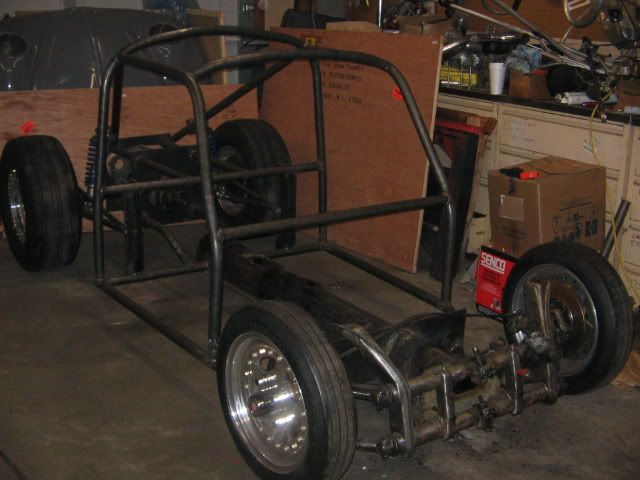
I will post some more tomorrow . Mike
Thanks so much for the pics n stories-keep it coming.
We tried really hard to make the cage fit as tight as possible to the body , even tied the roll cage hoop to the seat belt bolt on the B pillar.
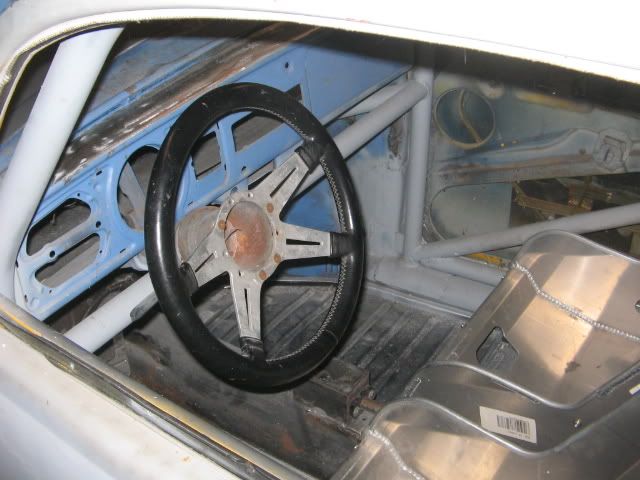
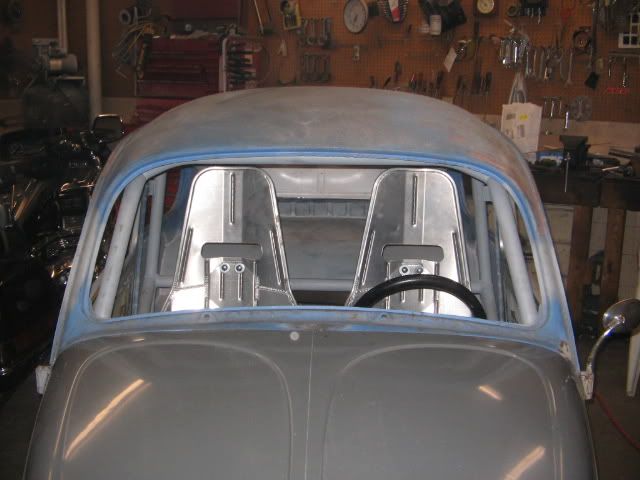
Another view of the cage on drivers side. When we had it certed the inspector wanted to see the lower pipe which is covered up by the heater ( just a
skin ) channel so we welded another pipe above the rocker and added a Kidney pipe to meet all standards.
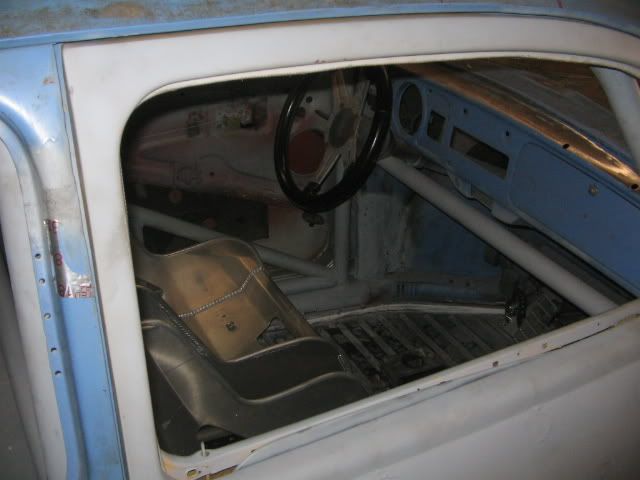
I needed a break from welding so we decided to work on the body awhile . The rear window had alot of rust at the bottom so instead of just patching it
up we decided to replace it with a fibre glass split kit. The first two we had sent to us did not come close to fitting the way I wanted to so I had
the company send me a kit that was not bonded together. After cutting and removing unneeded metal from the 67 window frame I fitted the two pieces
into place and clamped them to check for fit, perfect ! I removed the window and ground the whole area with a 36 grit disk so the fibre glass would
have something to bond to and then refitted both halves .
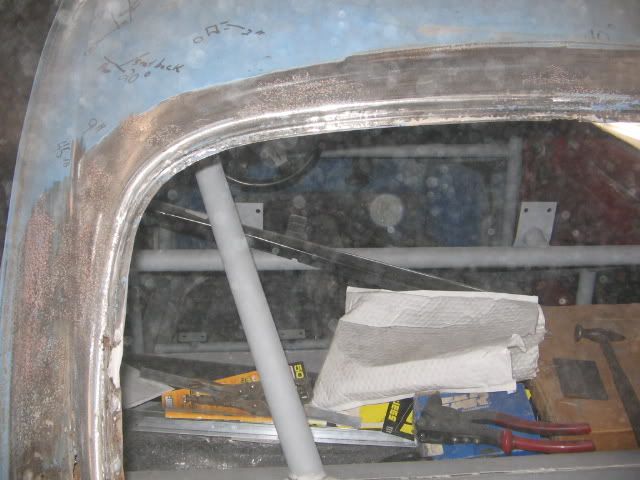
We had to roll it outside to get a better visual look to make sure it all looked right, ya man were we excited , LOL
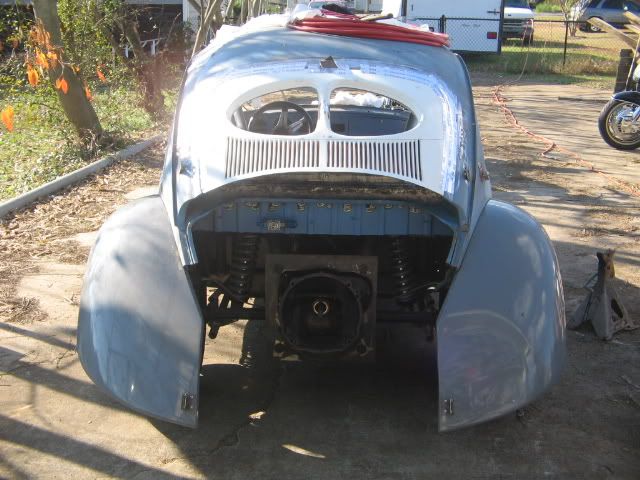
I went to the interior and started to glss the inner panel in place, the outer panel was taped in place with aluminum tape so it would stay flush and
also hold the inner panel from moving . You can see I used fibre glass and Matting rather than cloth as it was easier to pack and fill the gaps with
it.
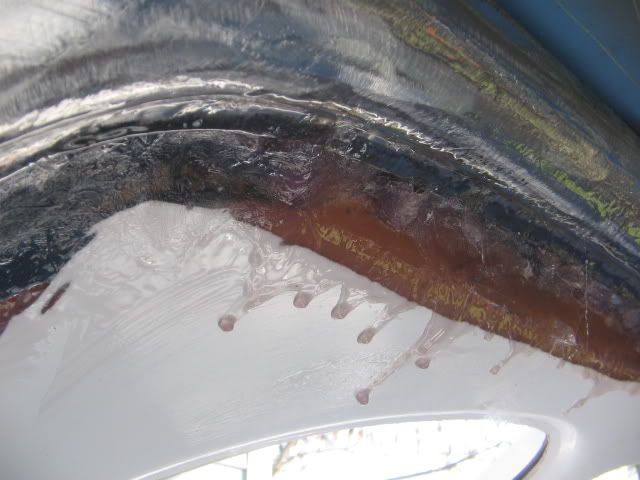
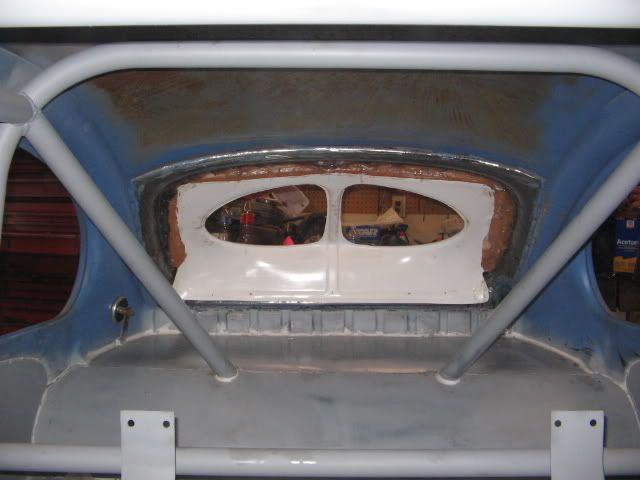
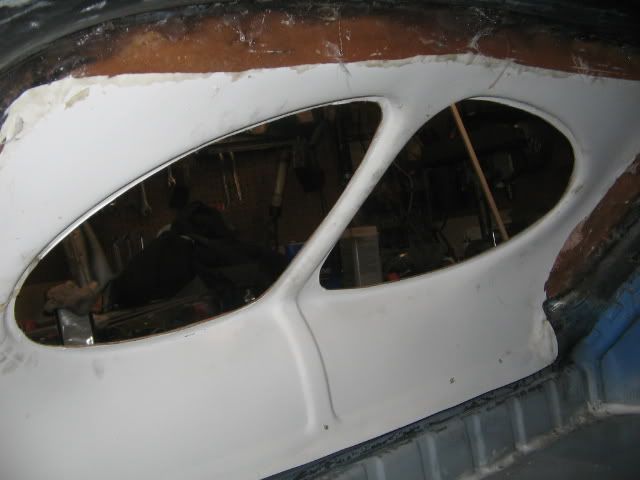
I let it harden all night and next morning I removed the outer skin , this is what it looked like ,
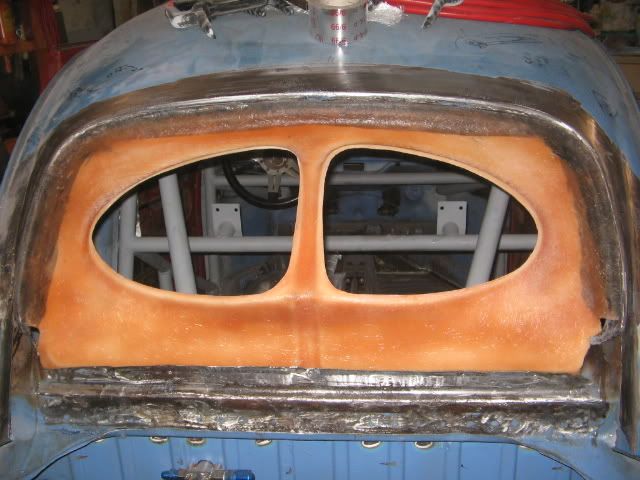
I was very happy so I filled the gaps and made a nice smooth surface for the outer skin to bond to .
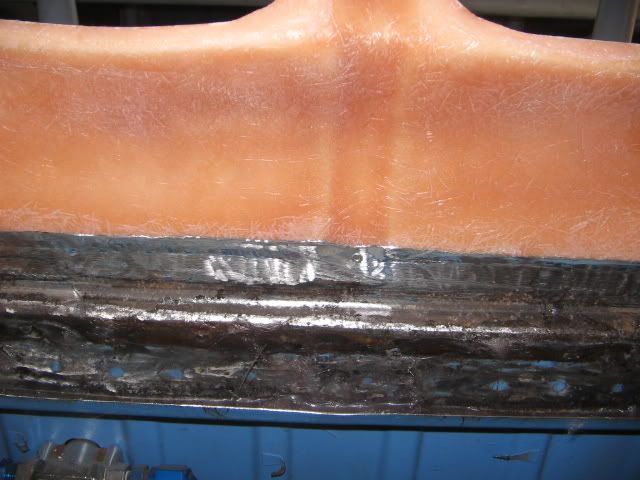
After prepping and checking the fit of the outside skin I painted both surfaces with Resin and filled gaps between both pieces with resin soaked
matting then clamped both pieces together, I think I used every clamp I owned.
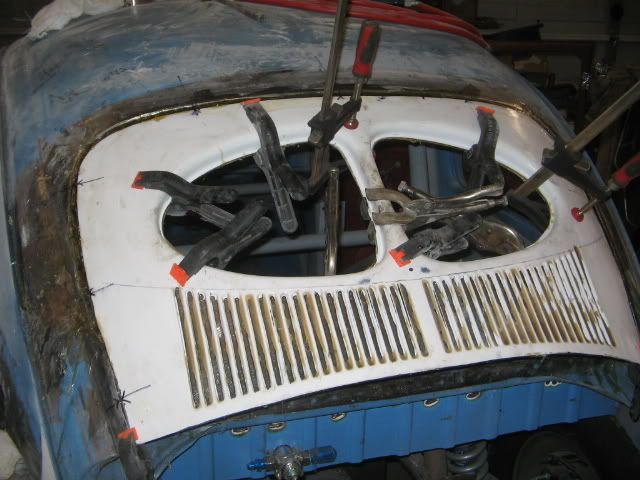
I ground all the excess glass and paint and put a skim coat of body filler over the whole area , time to fit up the wing and bread box, yippeeee !
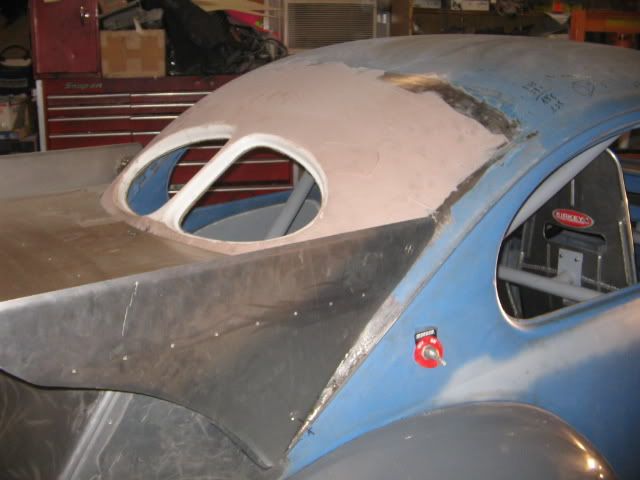
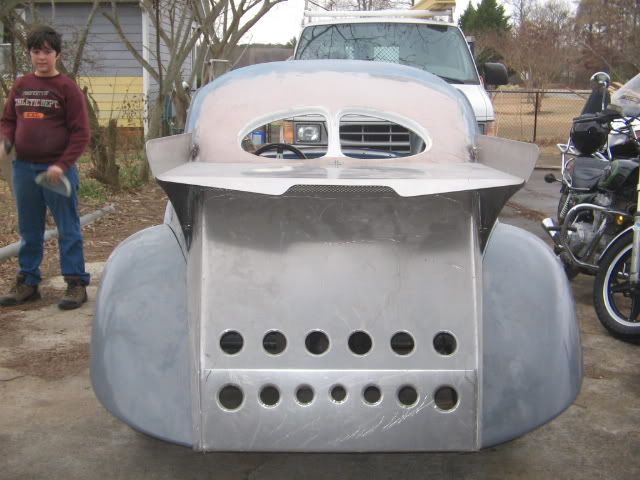
Looks hard as nails! Thanks for the write up, very cool to see the steps you took to get there.
That glass matting is DAMN strong isn't it? I use a flap disc to get the levels right coz it tears up sandpaper in seconds.
You are absolutely correct, you could hit the fibreglass with a hammer and not chip it . I used a 6" grinder disc with backing plate on my old air
grinder to remove the excess , small enough to get into tight places but big enough to make it pretty smooth. Before I ground it I used a small
sandblaster to remove the worst rust spots. I do have many many more pictures if there is something specific you want to see.
Well back to the chassis, we gutted the inside of the pan tunnel so we could use it to hide plumbing inside it , here you can see where we mounted
the fuel pump and we used a bulkhead connector to simplify our fuel line connection . Our fuel line , clutch and brake lines for the rear are inside
the tunnel .
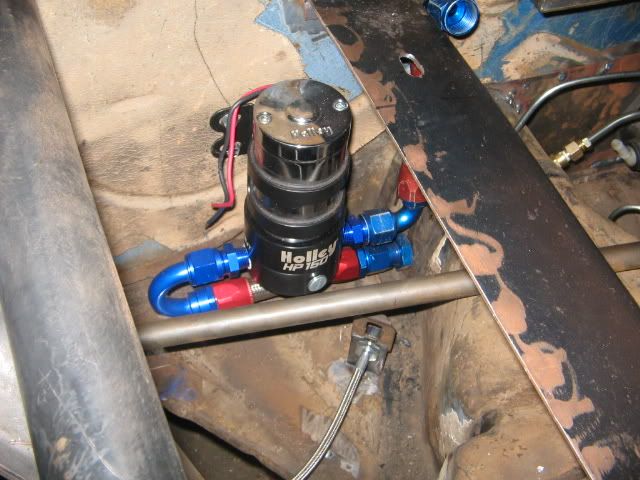
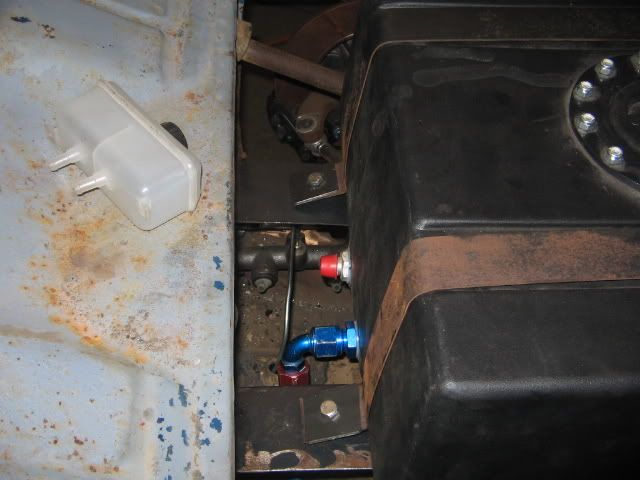
Some more pics of the front ,
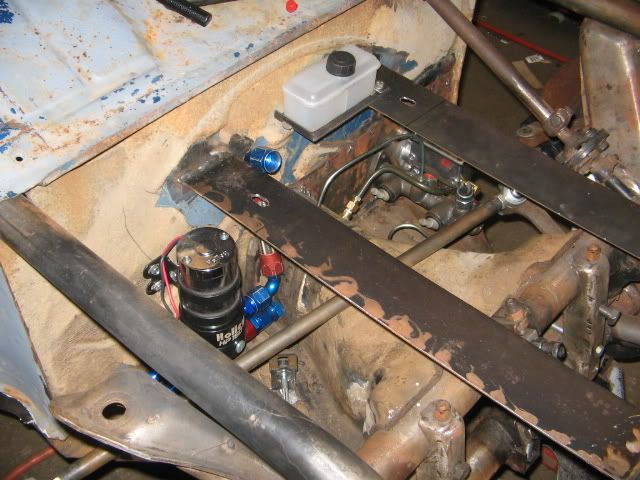
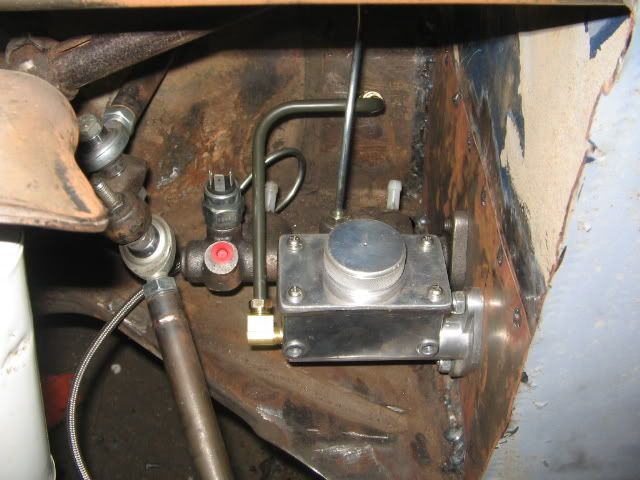
the tie rods were just slapped on in this picture so we could move the car around. We made those out of CM tubing, tapped them and used Heim joints
instead of tie rod ends and located them on the upper side . I added a flat washer just in case a joint ever came apart to retain it.
[URL=http://s91.photobucket.com/user/dragvw2180/media/Johnspics419.jpg.html
LOL , the front of the cage was pretty packed with stuff. Weight distribution was a big worry when we started on this project, we decided on a larger
fuel cell because this car is a street car. It was built for a race class called Unlimited Street East , you had to drive the car 20 miles and then
race it heads up , we didn't want to run out of fuel, LOL. We also wanted the battery up there so we mounted it under the front roll cage in a
battery box. The box and the lower roll cage unbolts from the beam so any and all of it can be removed.
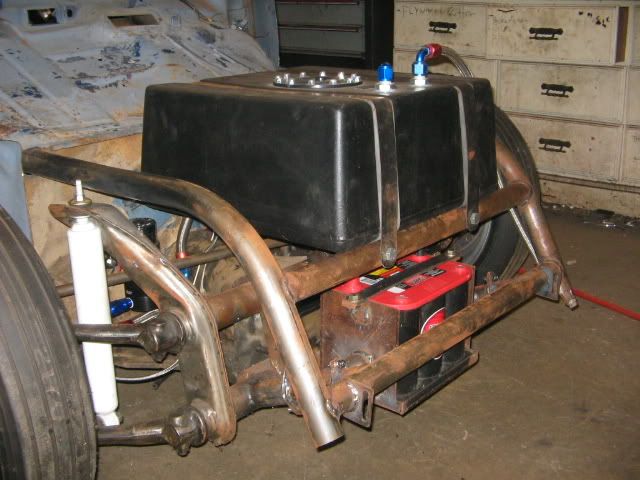
We used Heim joints for the tilt mechanism so we could adjust it up, down, and sideways, axtually worked out really well.
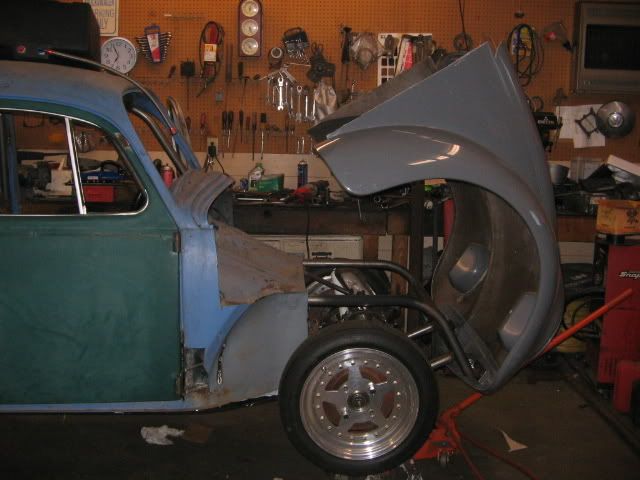
I also built stops so that when opened it would not crack the F/E , plus one person can open and close it without scraping any paint off
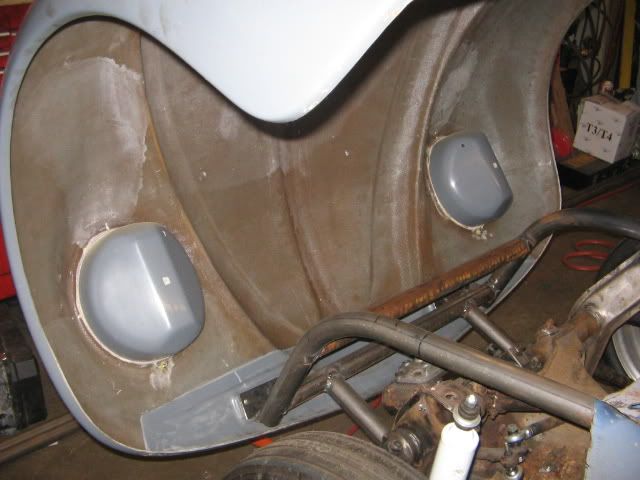
This is the best picture I have of how we built the tilt setup,
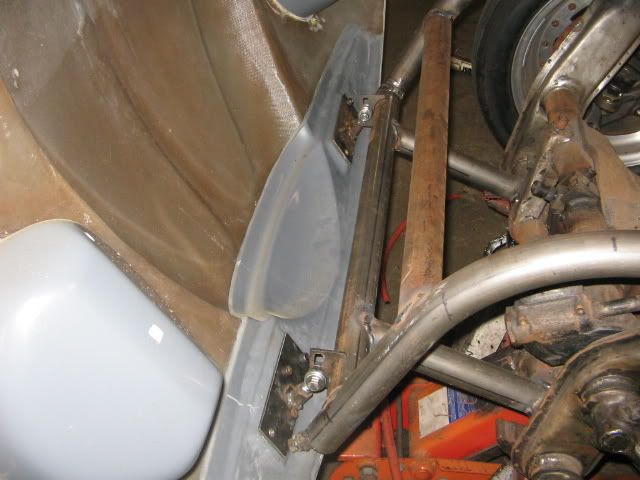
John's grandson dropped by to give us some help ,
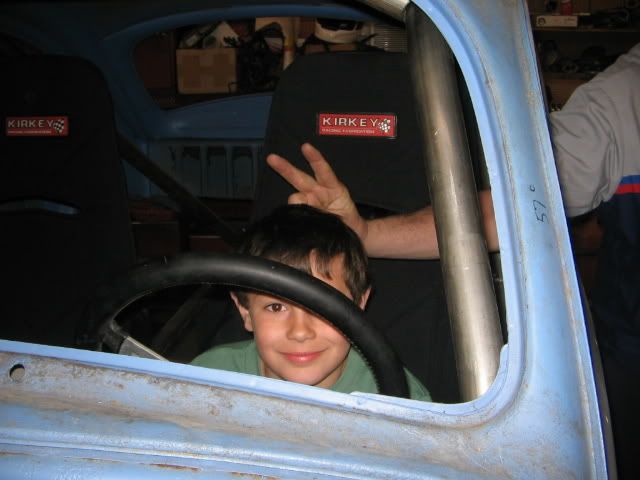
If anyone wonders what the numbers are on the paint, it is the degrees for each tubing bend on the roll cage . Two old guys trying to remember by
writing them down on the car as we went, LOL
After we completd the tilt we adjusted the F.E , was pretty happy with final result. John said he wanted the doors removable see we removed the hinge
pins and made removable pins out of bolts , left them a 1/4 long so we could push them out easily.
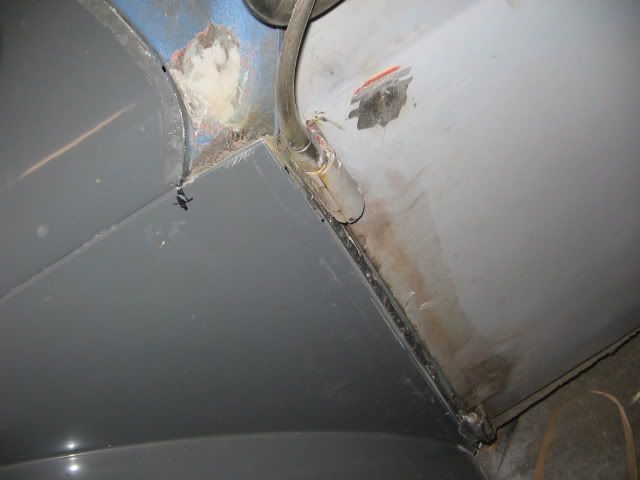
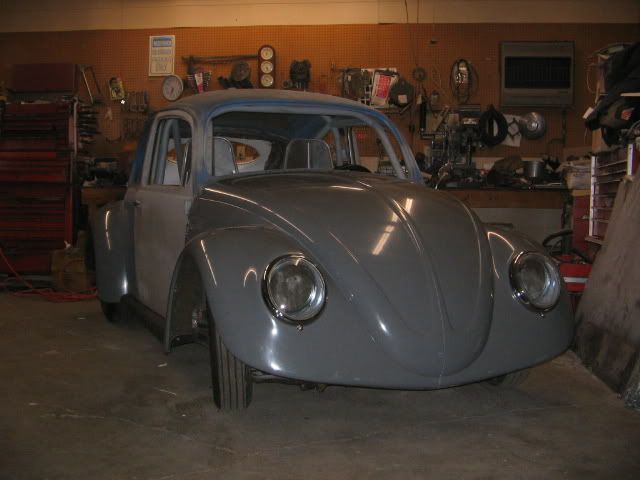
There never seemed to be an end to welding , my welding abilities are kinda like sex, I am not that good but I like doing it, LOL
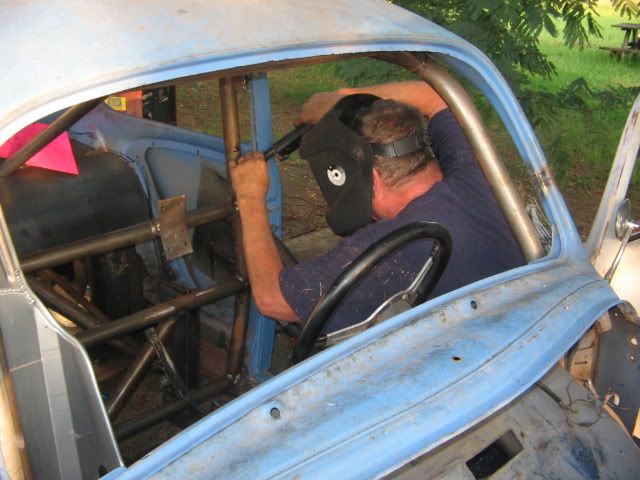
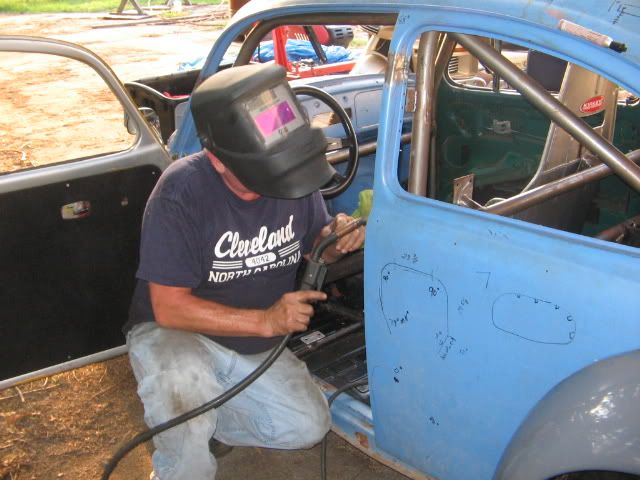
Time to go cut my grass , see you Monday, taking my wife to the coast for the weekend.
Notice my blue print for the rollcage pipe angles and lengths written on the car